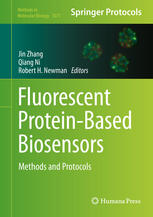

Most ebook files are in PDF format, so you can easily read them using various software such as Foxit Reader or directly on the Google Chrome browser.
Some ebook files are released by publishers in other formats such as .awz, .mobi, .epub, .fb2, etc. You may need to install specific software to read these formats on mobile/PC, such as Calibre.
Please read the tutorial at this link. https://ebooknice.com/page/post?id=faq
We offer FREE conversion to the popular formats you request; however, this may take some time. Therefore, right after payment, please email us, and we will try to provide the service as quickly as possible.
For some exceptional file formats or broken links (if any), please refrain from opening any disputes. Instead, email us first, and we will try to assist within a maximum of 6 hours.
EbookNice Team

Status:
Available4.6
22 reviewsIn Fluorescent Protein-Based Biosensors: Methods and Protocols, experts in the field have assembled a series of protocols describing several methods in which fluorescent protein-based reporters can be used to gain unique insights into the regulation of cellular signal transduction. Genetically encodable fluorescent biosensors have allowed researchers to observe biochemical processes within the endogenous cellular environment with unprecedented spatiotemporal resolution. As the number and diversity of available biosensors grows, it is increasingly important to equip researchers with an understanding of the key concepts underlying the design and application of genetically encodable fluorescent biosensors to live cell imaging. Written in the successful Methods in Molecular Biology series format, chapters include introductions to their respective topics,lists of the necessary materials and reagents, step-by-step, readily reproducibleprotocols, and notes on troubleshooting and avoiding known pitfalls.
Authoritative and easily accessible, Fluorescent Protein-Based Biosensors: Methods and Protocols promises to be a valuable resource for researchersinterested in applying current biosensors to the study of biochemical processesin living cells as well as those interested in developing novel biosensors tovisualize other cellular phenomena.